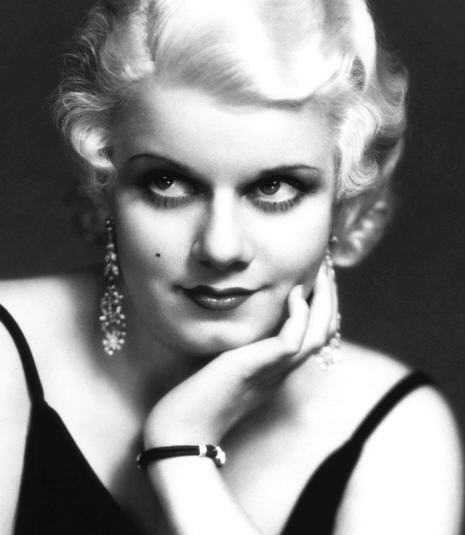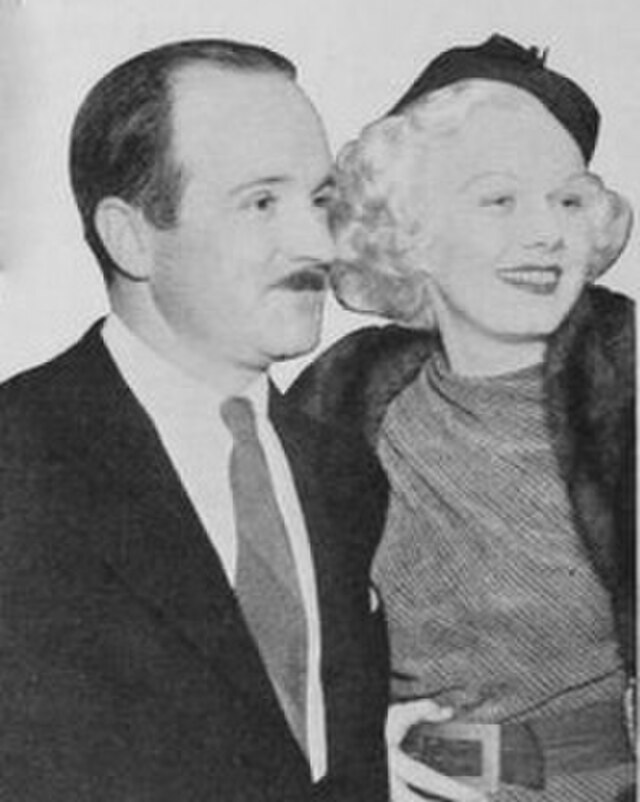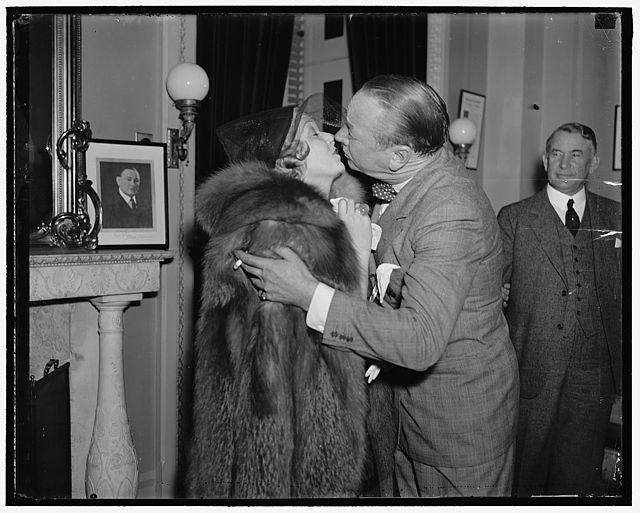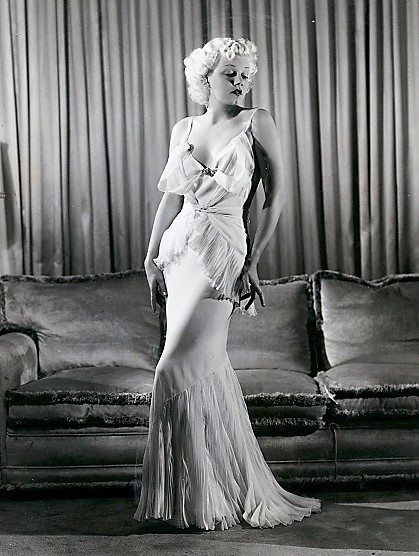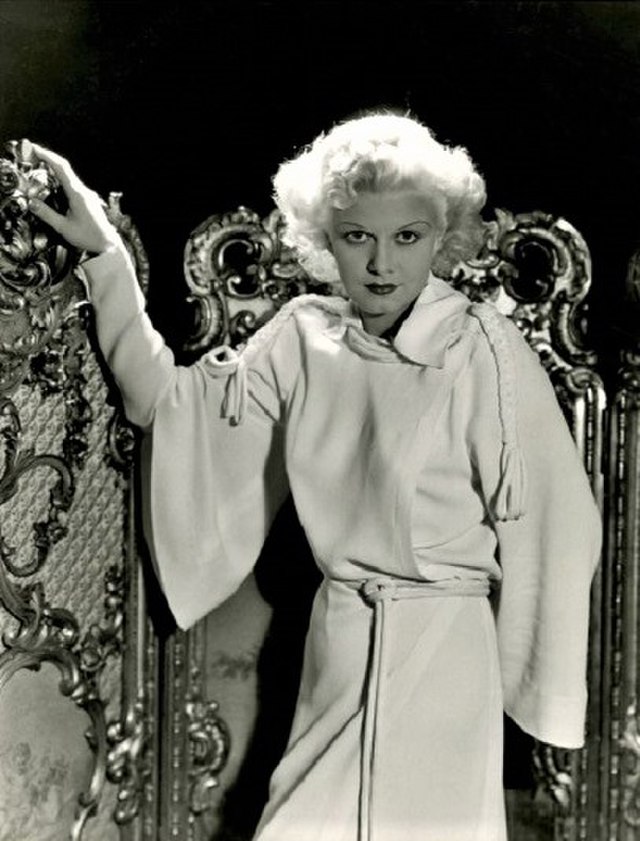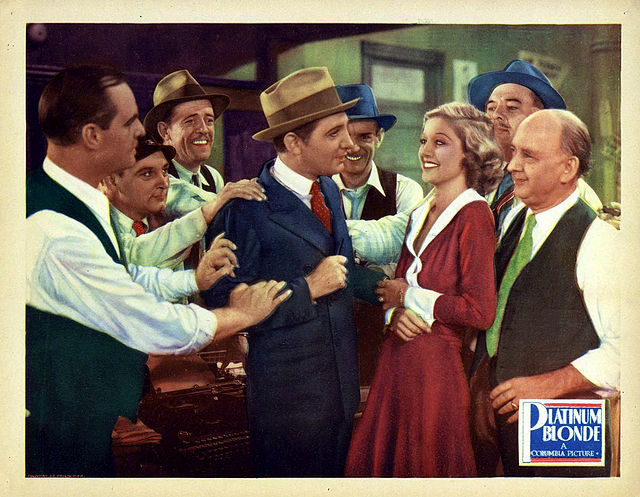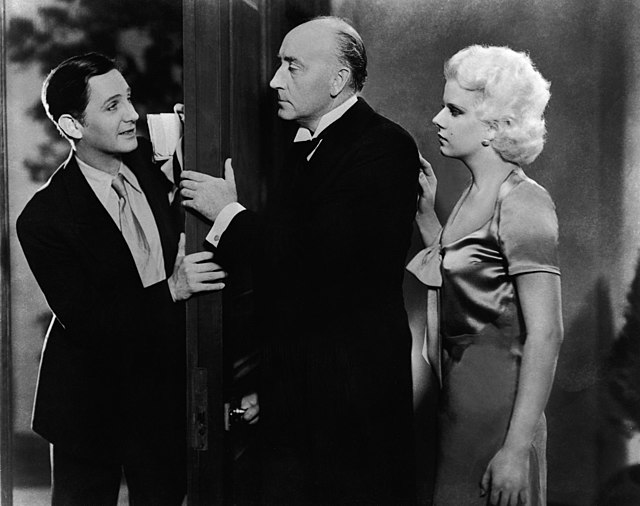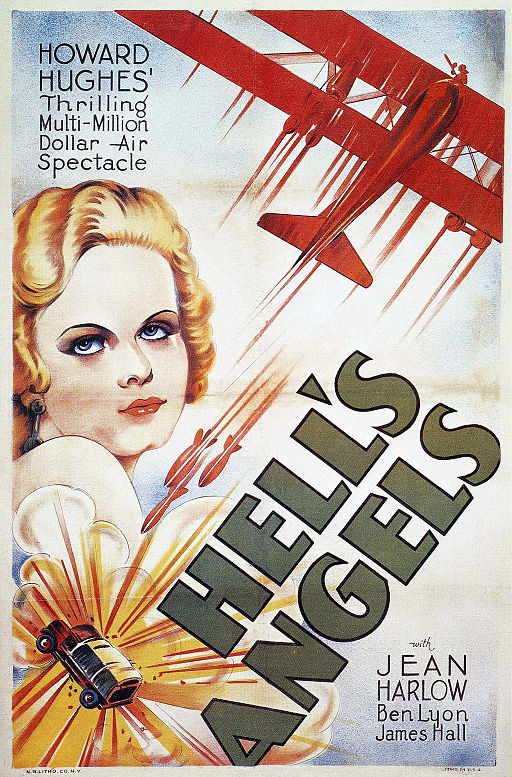Jean Harlow
back| Full Name | Harlean Harlow Carpenter |
| Stage Name | Jean Harlow |
| Born | March 3, 1911 |
| Birthplace | Kansas City, Missouri, USA |
| Died | June 7, 1937 |
| Buried | Forest Lawn Memorial Park, Glendale, California, USA |
| Married to | Charles McGrew (1927–1929), Paul Bern (1932; until his death), Harold Rosson (1933–1934) |
| Children | None |
| Notable films | Hell's Angels (1930) - Red Dust (1932) - Dinner at Eight (1933) - Bombshell (1933) - Reckless (1935) - Saratoga (1937) |
Jean Harlow
The Platinum Blonde
Jean Harlow was a leading Hollywood actress in the 1930s. Known as the "Platinum Blonde," she rose to fame with her breakout role in "Hell's Angels" (1930).
Harlow's magnetic screen presence and comedic timing made her a star in films like "Red Dust" (1932) and "Dinner at Eight" (1933).
Despite her glamorous career, her personal life was tumultuous, with three marriages and the tragic death of her second husband, Paul Bern.
Harlow's life was cut short by kidney failure on June 7, 1937, at age 26. She left an indelible mark on Hollywood, remembered for her bold, confident roles and enduring influence on future generations of actresses.
Related
Jean Harlow (1911 – 1937)
Biography, Career and all her Movies
Jean Harlow, born Harlean Harlow Carpenter on March 3, 1911, in Kansas City, Missouri, was the daughter of Mont Clair Carpenter, a dentist, and Jean Poe Carpenter, known as "Mother Jean." Her parents' marriage was troubled, leading to their separation when Harlow was young. After the divorce, she moved with her mother to Hollywood, California, seeking a new start.
Harlow's childhood was relatively privileged, thanks to her mother’s efforts to maintain a standard of living suited to her social aspirations. She attended the prestigious Ferry Hall School in Lake Forest, Illinois, where she was a popular and active student. However, her education was cut short when she eloped at 16 with Charles McGrew, a wealthy young man she had met during her teenage years.
Entry into Hollywood
The move to Los Angeles with McGrew inadvertently set Harlow on her path to stardom. Initially, she had no intentions of becoming an actress, but her stunning looks and magnetic presence made her an attractive prospect for film studios. In 1928, she appeared as an extra in a Laurel and Hardy film, marking her unplanned entry into the world of cinema.
Harlow's mother, eager to see her daughter succeed in Hollywood, encouraged her to pursue acting more seriously. Adopting her mother's maiden name, Harlow began to secure minor roles, gradually attracting attention with her unique look and vivacious personality.
Breakthrough and Rise to Fame
Jean Harlow's major breakthrough came in 1930 when Howard Hughes cast her in the epic war film "Hell's Angels." The role required her to showcase both her acting abilities and her striking physical appeal, particularly her platinum blonde hair, which became her trademark. The film's success catapulted Harlow to fame, earning her the nickname "The Platinum Blonde."
Following her success in "Hell's Angels," Harlow signed a contract with Metro-Goldwyn-Mayer (MGM), one of Hollywood's most prestigious studios. MGM capitalized on her image, casting her in a series of films that highlighted her comedic and dramatic talents. She starred alongside some of the era’s biggest stars, including Clark Gable, Spencer Tracy, and William Powell.
Major Films and Career Highlights
Throughout the early 1930s, Jean Harlow appeared in several iconic films that solidified her status as a leading lady in Hollywood. Some of her most notable works include:
- "Red Dust" (1932): A steamy romance set in the tropics, co-starring Clark Gable.
- "Dinner at Eight" (1933): A classic ensemble comedy directed by George Cukor.
- "Bombshell" (1933): A satirical take on Hollywood and the star system, where Harlow played a fictionalized version of herself.
- "Reckless" (1935): A dramatic film that showcased her versatility as an actress.
- "China Seas" (1935): Another successful pairing with Clark Gable, set aboard a ship facing a pirate attack.
- "Libeled Lady" (1936): A popular screwball comedy featuring a star-studded cast.
- "Saratoga" (1937): Harlow's final film, completed after her death with the help of a stand-in.
Personal Life and Marriages
Jean Harlow's personal life was marked by a series of high-profile relationships and marriages. Her first marriage to Charles McGrew ended in 1929, shortly after her rise to fame. In 1932, she married Paul Bern, an MGM executive. The marriage was marred by tragedy when Bern was found dead just two months later in what was ruled a suicide, though rumors and speculation about the circumstances persisted.
In 1933, Harlow married cinematographer Harold Rosson, but the marriage was brief, ending in divorce after less than a year. Despite these tumultuous relationships, Harlow remained a beloved figure in Hollywood, known for her warm personality and generous spirit.
Passions and Interests
Beyond her film career, Jean Harlow had a range of interests and passions. She was known for her love of animals, particularly dogs, and often contributed to animal welfare causes. Harlow also enjoyed writing and reportedly worked on a novel, though it was never published.
Harlow's vibrant personality and zest for life endeared her to colleagues and fans alike. She was known for her humor, often making light of her "dumb blonde" image with quick wit and charm. Despite her glamorous public persona, those who knew her personally described her as down-to-earth and kind-hearted.
Illness and Tragic Death
In early 1937, while filming "Saratoga," Jean Harlow began to experience serious health issues. She complained of fatigue, nausea, and abdominal pain. Initially diagnosed with influenza, her condition rapidly worsened. On June 6, 1937, she was admitted to Good Samaritan Hospital in Los Angeles.
Doctors soon discovered that Harlow was suffering from acute kidney failure, a condition that was poorly understood and untreatable at the time. Despite medical efforts, Jean Harlow passed away on June 7, 1937, at the age of 26. Her death sent shockwaves through Hollywood and left fans mourning the loss of one of its brightest stars.
Legacy
Jean Harlow was buried at Forest Lawn Memorial Park in Glendale, California, in a private ceremony attended by family, friends, and many Hollywood luminaries. Her legacy as one of the defining actresses of the Golden Age of Hollywood endures. Harlow's influence can be seen in the many stars who followed in her footsteps, and her films continue to be celebrated for their charm, wit, and style.
Jean Harlow's life, though tragically short, was marked by a meteoric rise to fame and an enduring impact on the film industry. Her talent, beauty, and spirit remain an integral part of Hollywood's rich history.
Discovering Jean Harlow:
Charismatic Acting Style of Jean Harlow:
Jean Harlow's acting style was a unique blend of charisma, naturalism, and boldness that made her one of the most iconic actresses of the Golden Age of Hollywood.
Natural Charisma
Harlow possessed an inherent screen presence that drew audiences to her. She had a magnetic charm that made her appear effortless in front of the camera. This natural charisma allowed her to stand out even in minor roles early in her career and quickly established her as a leading lady.
Versatility and Range
Harlow demonstrated remarkable versatility throughout her career, seamlessly transitioning between genres. Whether she was playing a sultry femme fatale, a comedic bombshell, or a dramatic heroine, Harlow brought a depth and authenticity to her characters. Her ability to handle both dramatic and comedic roles with equal skill showcased her broad acting range.
Comedic Timing
One of Harlow's most celebrated attributes was her impeccable comedic timing. She had a sharp wit and could deliver lines with a perfect blend of humor and sass. Films like "Bombshell" and "Dinner at Eight" highlight her talent for comedy, where her playful banter and exaggerated expressions added layers of humor to her performances.
Boldness and Confidence
Harlow's screen persona was marked by a bold and confident demeanor. She often portrayed strong, independent women who were unafraid to speak their minds and take control of their destinies. This assertiveness resonated with audiences and made her a symbol of modern womanhood during the 1930s.
Sensuality and Vulnerability
Harlow was a master at balancing sensuality with vulnerability. Her performances exuded a palpable sensuality, but she also imbued her characters with a sense of vulnerability that made them relatable and human. This duality is evident in films like "Red Dust" and "Hold Your Man," where her characters are both alluring and emotionally complex.
Emotional Authenticity
Despite the glamorous and often larger-than-life roles she played, Harlow brought a genuine emotional authenticity to her performances. She had a way of making her characters' struggles and triumphs feel real, which endeared her to audiences. Her ability to convey deep emotions with subtle gestures and expressions added a layer of realism to her roles.
Physical Expressiveness
Harlow's physical expressiveness was another key element of her acting style. She used her body language effectively to communicate her characters' emotions and intentions. Whether it was a sultry glance, a playful shrug, or an assertive stance, her physicality added depth to her performances and enhanced her overall screen presence.
Voice and Diction
Harlow's distinctive voice and diction also contributed to her unique acting style. Her voice was husky and expressive, capable of conveying a wide range of emotions. She had a way of delivering her lines with a blend of sophistication and earthiness, which made her characters feel grounded and real.
On-Screen Chemistry
Harlow had remarkable chemistry with her co-stars, particularly with frequent collaborators like Clark Gable. Her ability to create believable and dynamic relationships on screen added to the overall impact of her performances. The palpable chemistry she shared with her leading men made their romantic pairings compelling and memorable.
Breaking the Mold
Throughout her career, Jean Harlow broke the mold of traditional female roles in Hollywood. She portrayed women who were confident, sexually liberated, and unapologetically themselves. This departure from the demure and passive female characters of earlier eras made her a trailblazer and an enduring icon in film history.
In summary, Jean Harlow's acting style was a rich tapestry of natural charisma, versatility, comedic brilliance, bold confidence, emotional authenticity, and physical expressiveness. Her ability to blend sensuality with vulnerability and her distinctive voice and diction set her apart as one of the most memorable actresses of her time. Despite her brief career, Harlow's legacy continues to influence and inspire actors and audiences alike.
Personal Quotes:
· "I like to wake up each morning feeling a new man."
This humorous and cheeky line is often cited to showcase her playful personality.
· "When you lie down with dogs, you get up with fleas."
Harlow used this saying to emphasize the consequences of associating with the wrong people, reflecting her sharp wit.
· "I’m not a great actress, and I never thought I was. But I happen to have something the public likes."
This quote reflects Harlow's humility and self-awareness about her place in Hollywood.
· "Men like me because I don't wear a brassiere."
Known for her boldness and sex appeal, Harlow often made light-hearted remarks about her image.
· "I know, and that's all that matters."
This line, from her film "Dinner at Eight," is one of Harlow's most famous movie quotes and exemplifies her confident screen presence.
· "You know, I'm not the least bit ambitious. I just want to be a happy wife and have some children."
Despite her glamorous career, Harlow often expressed a desire for a simpler, more traditional life.
· "My God, must I always wear a low-cut dress to be important?"
Harlow was aware of the typecasting she faced in Hollywood and often commented on it with her characteristic candor.
· "I don’t want to be famous. I want to be happy."
This quote underscores her longing for personal fulfillment over professional fame.
What Others said about Jean Harlow:
- Clark Gable:
"She didn't want to be famous. She wanted to be happy. She was one of the most unaffected people I ever met. I never heard her complain about anything. She had a face that was extraordinarily beautiful, yet she never let it go to her head. She was always the same Jean."
Clark Gable, who co-starred with Harlow in several films, admired her down-to-earth nature and her professionalism.
- William Powell:
"Jean Harlow was a sweet, gentle, and talented soul, far removed from the brassy, blonde bombshell she often portrayed on screen. Her laughter was infectious, and her kindness genuine."
William Powell, who was romantically involved with Harlow and worked with her in "Libeled Lady," spoke fondly of her character.
- Louis B. Mayer:
"Jean Harlow was a true star. Her beauty and talent lit up the screen, but it was her spirit and resilience that truly made her shine."
The head of MGM, Louis B. Mayer, recognized Harlow's unique appeal and her contribution to the studio's success.
- Myrna Loy:
"Jean was a rare treasure. She had a wonderful sense of humor and a heart of gold. The camera loved her, and so did everyone who had the pleasure of knowing her."
Myrna Loy, who starred with Harlow in "Libeled Lady," appreciated her warmth and humor.
- David Stenn (Biographer):
"Jean Harlow was a pioneer in many ways. She broke the mold of the traditional Hollywood starlet with her frankness and genuine personality. Her influence on the film industry is still felt today."
David Stenn, author of "Bombshell: The Life and Death of Jean Harlow," highlighted her lasting impact on Hollywood.
- Leonard Maltin (Film Critic):
"Jean Harlow was more than just a 'platinum blonde.' She was a talented actress with impeccable comedic timing and an undeniable screen presence. Her films remain classics, and her legacy endures."
Renowned film critic Leonard Maltin praised her talent and enduring legacy in the film industry.
- Ginger Rogers:
"Jean was not only a beautiful and talented actress, but she was also a wonderful friend. Her warmth and kindness made her stand out in a town full of pretense."
Ginger Rogers, a contemporary and friend, valued Harlow's genuine nature.
- Joan Crawford:
"Jean Harlow was a great friend and a great actress. She had an effervescent personality that made everyone around her happy. Her passing was a tremendous loss to all of us."
Joan Crawford, a fellow MGM star, expressed her admiration and sorrow at Harlow's untimely death.
- Martin Scorsese (Director):
"Jean Harlow was a true icon of the Golden Age of Hollywood. Her performances were electric, and she had a raw talent that transcended the era she worked in. She remains a source of inspiration for filmmakers and actors alike."
Director Martin Scorsese acknowledged Harlow's influence on cinema and her timeless appeal.
- Marilyn Monroe:
"I always admired Jean Harlow. She was beautiful, funny, and so very talented. She paved the way for actresses like me, and I owe a lot to her."
Marilyn Monroe, often considered a successor to Harlow's screen persona, recognized the trail Harlow blazed for future actresses.
Awards and Recognition:
Jean Harlow's career, though impactful and iconic, did not coincide with an era where the film industry's award systems were as established or as comprehensive as they are today. As a result, she did not receive major awards or nominations during her lifetime.
Recognition During Her Lifetime
- Motion Picture Hall of Fame: Jean Harlow was one of the first inductees into the Motion Picture Hall of Fame in 1937. This honor highlighted her significant impact on the film industry during her brief but illustrious career.
Posthumous Recognition
Despite the lack of formal awards during her lifetime, Jean Harlow's legacy has been honored in various ways posthumously:
- Hollywood Walk of Fame: Jean Harlow was awarded a star on the Hollywood Walk of Fame at 6910 Hollywood Boulevard. This star commemorates her contributions to the film industry and her status as a Hollywood icon.
- American Film Institute: In 1999, the American Film Institute ranked her as the 22nd greatest female star of classic Hollywood cinema in their list of the "AFI's 100 Years...100 Stars."
Cultural Impact and Legacy
Jean Harlow's influence and contributions to cinema have been recognized through various retrospectives, documentaries, and books. While she may not have received formal awards during her career, her legacy has been celebrated in numerous ways:
- Documentaries and Biographies: Several documentaries and biographies have been made to honor her life and career, such as "Harlow: The Blonde Bombshell" and the biography "Bombshell: The Life and Death of Jean Harlow" by David Stenn.
- Film Retrospectives: Many film festivals and retrospectives have showcased her work, celebrating her contributions to the film industry and her lasting impact on Hollywood.
- Cultural References: Jean Harlow's image and persona have been referenced and celebrated in various cultural contexts, from fashion to modern film, illustrating her enduring influence as a style icon and cinematic legend.
Movies featuring Jean Harlow:
1928
- Honor Bound: Jean Harlow had an uncredited role in this silent film about a man who must clear his name after being wrongfully accused of theft.
- Moran of the Marines: Another uncredited role, this film is a romantic comedy about a Marine who falls in love with a young woman while stationed overseas.
1929
- Double Whoopee: Harlow had a bit part in this silent comedy short featuring Laurel and Hardy as doormen who cause chaos at a high-class hotel.
- The Saturday Night Kid: A drama starring Clara Bow, in which Harlow played a minor role as Hazel, the flirtatious shopgirl.
1930
- Hell's Angels: Harlow's breakout role in this World War I aviation epic directed by Howard Hughes. She played Helen, a woman involved in a love triangle with two fighter pilots.
- The Love Parade: An uncredited role in this Ernst Lubitsch musical about a military officer and a queen who fall in love.
- City Lights: Another uncredited role, this Charlie Chaplin film is a silent romantic comedy about the Tramp who falls in love with a blind flower girl.
1931
- The Secret Six: A crime drama where Harlow played Anne Courtland, a reporter involved with a group of mobsters.
- Iron Man: A boxing drama where Harlow portrayed Rose Mason, the wife of a boxer whose career she manipulates.
- Goldie: Harlow starred as Goldie, a nightclub singer involved in a romantic plot with a sailor.
- The Public Enemy: A classic gangster film where Harlow played Gwen Allen, a society girl who becomes involved with the protagonist, Tom Powers.
1932
- Three Wise Girls: Harlow starred as Cassie Barnes, a small-town girl who moves to New York City and becomes entangled in romantic complications.
- Red-Headed Woman: Harlow played Lil Andrews, a scheming secretary who seduces her way up the social ladder.
- Red Dust: A romantic drama set on a rubber plantation, Harlow played Vantine, a prostitute who falls for the plantation manager, played by Clark Gable.
1933
- Hold Your Man: A romantic drama where Harlow played Ruby Adams, a streetwise woman who falls in love with a con man.
- Dinner at Eight: An ensemble comedy where Harlow played Kitty Packard, a vulgar but lovable wife of a wealthy businessman.
- Bombshell: A satire on Hollywood, Harlow starred as Lola Burns, a film star overwhelmed by her chaotic personal and professional life.
1934
- The Girl from Missouri: Harlow played Eadie Chapman, a chorus girl determined to marry a millionaire while maintaining her virtue.
- The Beast of the City: Harlow played Daisy Stevens, a nightclub singer involved with a police chief.
1935
- Reckless: Harlow played Mona Leslie, a Broadway star whose life becomes entangled with a wealthy family's troubles.
- China Seas: A high-seas adventure where Harlow played Dolly, a brassy singer involved with Clark Gable's character.
- Riffraff: Harlow played Hattie Tuttle, a factory worker who becomes romantically involved with a union organizer.
1936
- Wife vs. Secretary: Harlow played Whitey, a loyal secretary whose close relationship with her boss causes tension in his marriage.
- Suzy: Harlow starred as Suzy, a showgirl who becomes a widow and gets entangled in wartime espionage.
- Libeled Lady: A screwball comedy where Harlow played Gladys Benton, who gets caught up in a scheme to discredit a wealthy socialite.
1937
- Personal Property: Harlow played Crystal Wetherby, a widow who hires a man to pose as her butler to avoid losing her home.
- Saratoga: Harlow's final film, where she played Carol Clayton, a woman involved in a love triangle set against the backdrop of horse racing. The film was completed using a stand-in after Harlow's death.
Short Films
- Bacon Grabbers (1929): A Laurel and Hardy short where Harlow had a small role as a maid.
- Beau Hunks (1931): Another Laurel and Hardy short featuring Harlow in a minor role.

